sierraclub.org - sierra magazine - march/april 2009 - bikes!


Bikes!
Everywhere you turn, cyclists are welding pedals, wheels, and frames into a world that's more efficient--and eccentric
By Della Watson
Building Bike Cities
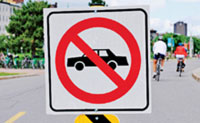
Marketing strategist Gil Penalosa gained international recognition for transforming Bogota, Colombia, with a web of parks and urban trails that encourage people to walk, bicycle, skate, and play outdoors. Now he advises urban planners worldwide on ways to invigorate their shared spaces.
SIERRA: While you were Bogota's commissioner of parks, sport, and recreation, you championed something called the Ciclovia: 91 kilometers of car-free roads open to bicyclists and pedestrians on Sundays. What made Ciclovia a success?
Gil Penalosa: Ciclovia attracts more than 1.5 million of Bogota's 7 million people every week. It is successful because it uses existing infrastructure and benefits all the population. This can be replicated in any city in the world.
SIERRA: Fear keeps some people from bicycling and walking. What can cities do to make these activities safer?
Penalosa: The goal of any pedestrian and cycling plan should be to meet the 8/80 rule: Would you send an 8-year-old on a walk or ride? An 80-year-old? If you would, it is safe enough. If you would not, then it is not.
SIERRA: How can activists change the minds of politicians, transportation engineers, and city planners who believe Americans won't give up their cars?
Penalosa: People do change. In the 1970s, less than 10 percent of the people in Copenhagen used bicycles for transportation; today 40 percent do. We have a challenge but also a magnificent opportunity to improve existing cities as well to build better ones in the future.
SIERRA: What tools can bicycle advocates use to persuade their city government to invest in things like bike facilities and infrastructure?
Penalosa:Governments are facing the enormous costs produced by the obesity crisis, traffic congestion, global warming, and the need for recreation. We must position walking and bicycling as an investment that will alleviate those problems. --interview by Della Watson
The best bike I ever owned was a mutt made of scrap parts my dad salvaged from a dumpster behind Big Lots and lovingly transformed into the toughest set of wheels on the block. I took more than a few high-speed rides on that red and black no-brand, reveling in the idea that wherever I wanted to go in life, I had the means to get there.
That feeling doesn't have to be lost in adulthood. Fully grown people's appreciation of bicycles often verges on awe and blooms into obsession. In an economically uncertain time, it's nice to know that a simple, inexpensive machine can still change lives and communities. The folks at Working Bikes and Pedals for Progress resurrect spokes and frames from the scrap heap, doing their part to rebuild the fabric of transportation in the United States and increase the earning power of people worldwide. Inventors and artists expand the reach of a classic design by creating pedal-powered workhorses. Visionaries like Gil Penalosa push cities to adopt sustainable, bike-friendly planning models. We've entered an era of change, and when the new world emerges from the cloud of carbon irresponsibility and reckless spending, the bicycle, in all its strange and glorious incarnations, will still be there to take us wherever we want to go.
Off-the-Grid Pedaling
Snow Stopper
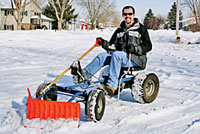 Trek Bicycles engineer Kevin Blake married an old lawnmower frame to leftover bike parts to create a pedal-powered snowplow. It promptly scooped up an Innovate or Die award in a contest sponsored by Google and Specialized.
Trek Bicycles engineer Kevin Blake married an old lawnmower frame to leftover bike parts to create a pedal-powered snowplow. It promptly scooped up an Innovate or Die award in a contest sponsored by Google and Specialized.
Bicimaquinas
Since 1997, Guatemalan nonprofit Maya Pedal has been using modified bicycles to power devices ranging from water pumps to grain mills.
DIY Spin Cycle
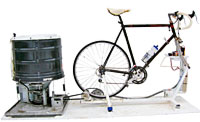 Dave Askins of Ann Arbor, Michigan, cranks and pedals to cleanliness about five loads of laundry a month.
Dave Askins of Ann Arbor, Michigan, cranks and pedals to cleanliness about five loads of laundry a month.
Fender Blender
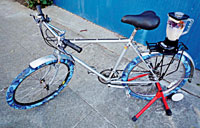 It takes just a minute to whip up a morning smoothie or an after-work margarita with a pedal-powered blender from Rock the Bike.
It takes just a minute to whip up a morning smoothie or an after-work margarita with a pedal-powered blender from Rock the Bike.
--Dan Oko
No Numbskulls
 Bern
Bern
Specializing in all-sport lids for the X Games set, Bern introduced the Watts model, popular with bike messengers and BMX stunt riders.
 Garneau
Garneau
Triathletes and time-trial racers benefit from the Superleggera's golf-ball-like surface, which improves airflow while intimidating competitors.
 Yakkay
Yakkay
Safety and style unite in Paris--one of four mock-hat helmets for cycling fashionistas.
--Della Watson
Paint that Bike Red
Bicycles let riders experience--and engage with--their communities. No wonder so many co-ops are making the trusty bike a collective resource.
Pedals for Progress
High Bridge, New Jersey
Founder Dave Schweidenback calls what his organization does "kind of a Robin Hood routine." He got the idea in the late 1970s while serving as a Peace Corps volunteer in Ecuador. "I noticed that the one guy in town who had a bike was wealthier than everyone else," says Schweidenback, "and suddenly it dawned on me why: He could get places!"
When Schweidenback returned home, he harvested unwanted bikes--by scouring landfills, requesting donations, and forging relationships with county recycling programs--and sent them to impoverished communities around the world. He bemoans the fact that the world's underemployed people are willing to work but have no way to get there. In Nicaragua, he says, as soon as someone gets a bike, he or she enjoys a 14 percent income increase.
By building a bike-based society, there is less need for costly infrastructure, Schweidenback says: "If we can convince these communities to stay in a sustainable mode, then we're creating cleaner societies for the future."
Working Bikes Cooperative
Chicago
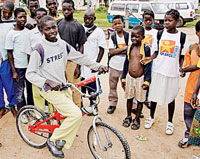 An Angolan boy shows off his new Working Bikes wheels.
An Angolan boy shows off his new Working Bikes wheels.
"You know how they say there's no free lunch? Well, there's always a free lunch at Working Bikes," says Raul Gonzalez, the organization's enthusiastic self-described "acquisitions and outreach guy."
Working Bikes was founded in 1998 when Lee Ravenscroft, an engineer by trade, started pulling bikes out of scrap yards, refurbishing them, and donating them locally and overseas. Gonzalez got involved when he saw Ravenscroft working alone to unload hundreds of bikes from a truck and stopped to help. The next thing Gonzalez knew, he and ten others were packaging them for delivery to Angola. That was three years ago.
Today Working Bikes has a steady stream of about 100 volunteers, the ability to ship more than 4,000 bikes per year, and "no bureaucracy," says Gonzalez. Beneficiaries also include Chicago-area homeless shelters and refugees from Iraq, Burma, and Cuba. "Having a bike is a nice beginning," Gonzalez says.
Bikes Across Borders
Austin
Since it's housed at the Rhizome Collective (rhizomecollective.org), in a warehouse that also provides space to an organization that sends books to prisoners, another that provides food to the homeless, and several others, the only expense Bikes Across Borders has is its $100-per-month rent. Roy Coon, a member of the collective ("There's no real hierarchy," he says when asked about his position), explains that Rhizome's landlord "isn't trying to make money off us; he's just trying to sustain us."
Bikes Across Borders also takes money out of the equation. "All the bikes and tools we have are donated or acquired by our own means, like dumpster diving," says Coon, "and the work done on the bikes is volunteer."
The group runs a bike library, allowing anyone to check out a bike for use around town, which, in turn, helps test bicycles slated for donation to Latin America.
Bikes Across Borders will often caravan the donations over; on the last trip, volunteers rode about a dozen bicycles 350 miles to Nuevo Laredo, Mexico, taught recipients how to maintain them, and took a bus home to Texas. Future deliveries, Coon says, will include an original musical show "about bike riding, solidarity, and the way we feel about life."
Plan B
New Orleans
Taking the "teach a man to fish" approach, volunteer-run Plan B won't fix your bike for any amount of money--but it will show you how to do it for free. If you don't have a bike, the group will guide you through building one from scratch using low-cost parts others have donated. Either way, you get to use the group's professional-grade tools and work space.
The Bike Kitchen
San Francisco
At this DIY repair shop stocked with tools, parts, and knowledgeable volunteers, membership costs $5 per day, or $40 per year, but can also be bought with volunteer hours. Programs include hands-on bike-maintenance classes; a monthly night for people whose gender or sexual orientation has deterred them from learning mechanics; and Earn-a-Bike, in which members complete a list of chores in exchange for a bike.
Wheels4Wellness
Washington, D.C.
The U.S. House of Representatives debuted its bike-sharing program last spring, making some 30 bikes available for elected officials to borrow and use around Capitol Hill. Helmets are provided too, since even lawmakers can sometimes use good judgment. --Avital Binshtock
Photos, from top: iStock/mathieukor, Jonathan Maus/BikePortland, Telstar Logistics, Nemo Gould, Peter E. Gorman, Brent Curry, Xylon Bikes, Adrian Cotter, Xtracycle, TrioBike, Andy Purviance, Ktrak, Stefano "18k" Di Prima, Kevin Blake, Dave Askins, Paul McKenzie, Bern Unlimited, Louis Garneau, Yakkay, Guerra Freitas